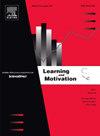The negative effects of external rewards on young language students’ performance, withdrawing, and psychological factors: An experimental study
IF 1.7
4区 心理学
Q3 PSYCHOLOGY, BIOLOGICAL
引用次数: 0
Abstract
Investigating the factors influencing the acquisition of a L2 among young learners is a valuable area for researchers and practitioners. In schools, external rewards are commonly employed by language teachers to enhance primary school students’ performance on language tasks and increase their motivation. However, the impact of this practice on this age group remains largely unexplored, with no experimental studies conducted to date. Therefore, this study represents the first to delve into the influence of the extrinsic reward system while engaging students in a language activity. Specifically, we investigated whether introducing an extrinsic reward in the first language task and removing it in the second impacts young students’ performance, withdraw from doing the activity, and psychological factors including intrinsic and external motivation, anxiety, perceived difficulty, and frustration. Our results showed that primary school students (grade 6) performed poorly in the second round once the reward was removed. Moreover, 14 % of the students, among them those who won the first round, withdrew from participating in the second round. Furthermore, losers exhibited lower levels of intrinsic motivation but a higher sense of difficulty, frustration, and external motivation, indicating that losing a reward can negatively affect students’ language performance and psychological factors. Also, we found that our experimental results are consistent among the two genders. We conclude the paper with important implications for the use of the extrinsic reward system for language teaching purposes.
外部奖励对青年语言学生成绩、退缩及心理因素的负面影响:一项实验研究
研究影响年轻学习者二语习得的因素对研究者和实践者来说是一个有价值的领域。在学校中,语言教师通常采用外部奖励来提高小学生在语言任务中的表现,增加他们的动机。然而,这种做法对这一年龄组的影响在很大程度上仍未被探索,迄今为止还没有进行过实验研究。因此,本研究首次深入探讨了外在奖励制度对学生参与语言活动的影响。具体而言,我们调查了在第一语言任务中引入外部奖励并在第二语言任务中移除它是否会影响年轻学生的表现、退出活动以及包括内在动机和外部动机、焦虑、感知困难和挫折在内的心理因素。我们的研究结果显示,在取消奖励后,小学生(六年级)在第二轮的表现不佳。此外,14 %的学生,其中那些谁赢得了第一轮,退出了参加第二轮。此外,失败者表现出较低的内在动机水平,但有较高的困难感、挫败感和外部动机,这表明失去奖励会对学生的语言表现和心理因素产生负面影响。此外,我们发现我们的实验结果在两性之间是一致的。最后,我们对外在奖励系统在语言教学中的应用提出了重要建议。
本文章由计算机程序翻译,如有差异,请以英文原文为准。
求助全文
约1分钟内获得全文
求助全文
来源期刊

Learning and Motivation
Multiple-
CiteScore
2.90
自引率
0.00%
发文量
53
期刊介绍:
Learning and Motivation features original experimental research devoted to the analysis of basic phenomena and mechanisms of learning, memory, and motivation. These studies, involving either animal or human subjects, examine behavioral, biological, and evolutionary influences on the learning and motivation processes, and often report on an integrated series of experiments that advance knowledge in this field. Theoretical papers and shorter reports are also considered.
 求助内容:
求助内容: 应助结果提醒方式:
应助结果提醒方式:


